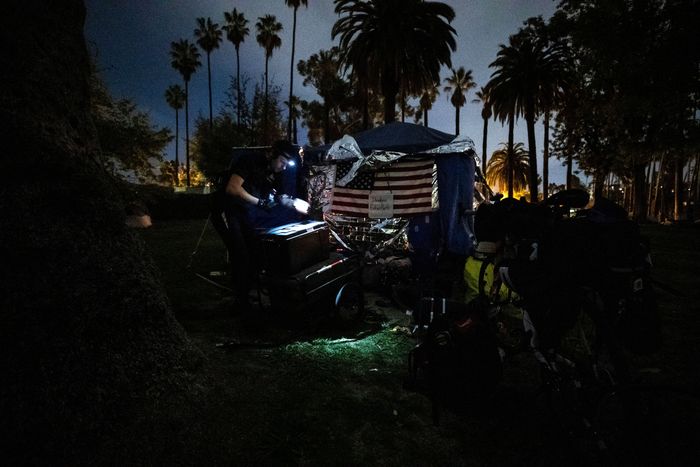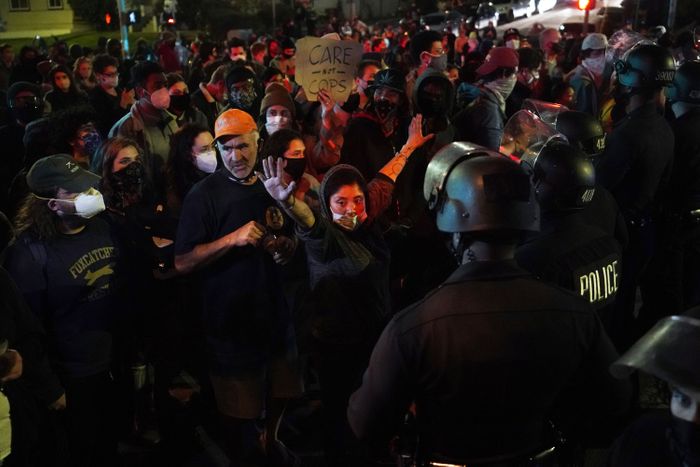
For the past three months, Echo Park Lake had become a refuge for Zachary Coughlin and Karissa DeAngelis. After sleeping on cold, unyielding sidewalks, the couple had experienced relatively peaceful nights here among a community of about 100 people who had pitched tents on the grass along the park paths, sharing their mornings with joggers making loops around the water, street vendors prepping ingredients under rainbow umbrellas, and toddlers ambling towards the playground. But on Thursday morning, they had the park virtually to themselves. A militarized police occupation of the quiet neighborhood had been staged in the dark, with dozens of patrol cars blocking access to surrounding streets and sidewalks, and officers setting up checkpoints in residents’ driveways. Overnight, the entire 16-acre park, which had just reopened six years ago after a $45 million renovation, had been completely walled off once again, with a bright blue banner reading “Echo Park Temporarily Closed Due to Renovations.” Shouting over the groan of helicopters, Coughlin and DeAngelis lugged their four suitcases and two overstuffed backpacks several blocks to a temporary storage bin provided by service providers while they figured out their next move. “I’m used to this,” Coughlin said over his shoulder. “We did this for a long time before we found Echo.”
For nearly a week, rumors of the park’s closure had been shared among homeless advocates. When the Los Angeles Times reported that the park was to be closed Thursday and that all residents living around the lake would be forcibly removed, Councilmember Mitch O’Farrell, who represents Echo Park, refused to confirm the timing. A work order had been filed to the city March 18, detailing some improvements like repainting bathrooms and replacing water fountains that, while involved, certainly wouldn’t necessitate a full shutdown. Finally, late Wednesday night, signs noting that all residents had to leave by Thursday at 10:30 p.m. were duct-taped around the park, barely 24 hours before the eviction. Theo Henderson, an activist and host of the podcast We the Unhoused, didn’t think that was nearly enough notice. “What is the plan here?” he said. “Show up at 10:30, throw them out, and take a steamroller over the park?”
At a large rally the previous morning attended by both housed and unhoused neighbors, lake residents had spoken about the feeling of freedom and safety they had found in the community, where members had planted a garden, built a communal kitchen, and even held a wedding the previous week. “It’s been so refreshing to live like a normal citizen again, not like a second-class citizen,” said Ayman Ahmed, who has lived in the park for a year. Later that night, Ahmed was behind a bullhorn, leading the crowd in chants while HOUSEKEYS NOT HANDCUFFS was projected in neon green on the fountain in the center of the lake. Brandishing batons and foam-bullet guns as they stood before banners reading HEALING HAPPENS HERE about 400 police officers in riot gear advanced upon the crowd. On the opposite side of the lake, city crews quickly erected steel-framed fencing, sealing in the dozen or so residents who decided to stay the night — and couldn’t come back in if they opted to leave — and dozens more residents’ tents and personal belongings.
“It’s sketchy,” said Sachin Medhekar, a neighborhood councilmember who works with SELAH, a homeless advocacy group that has been working to help lake residents get access to permanent housing for years. “This isn’t about prioritizing the health and wellness of residents, it’s about, ‘Oh, the Lotus Festival is coming up, gotta have the park clean.’” Tupac Zapata, who is also on the neighborhood council, and whose family has rented in the neighborhood for 29 years, sympathizes with concerns about people living in a public space, but he also knows locals who have become homeless and moved into the park. He places the blame on the city’s inability to create more housing — particularly public housing — in the swiftly gentrifying neighborhood. “New housing here is designed for professionals — it’s not for families,” he said. “The city has failed to build more as the population grows.”
In a statement, O’Farrell claimed that over 200 people from the lake had been placed into housing, some in downtown hotels as part of Project Roomkey, a city-run, FEMA-funded program that rents hotel rooms to temporarily shelter unhoused residents during the pandemic. But accepting a hotel room might mean being exiled to a far-flung location with very specific rules — curfews, no pets, only two bags of belongings allowed — which exclude many potential participants. As the red strobe lights of police cruisers lit up the park’s pink trumpet trees, one woman sitting in a camp chair outside a large tent who declined to give her name noted that she hadn’t left because the 7 p.m. curfew conflicted with her work schedule. Besides, participating in a pandemic-era program that’s meant to end soon would mean she’d be right back on the streets in a few months, she said. “If they had an actual solution for housing that they can offer, then that would be great.”
The urgency and violence of the forced eviction shocked homeless advocates, who said the actions were rushed and badly timed. A tiny-home village designed for interim housing is weeks away from completion just blocks away; waiting for that to be opened might have created an alternative more welcome than distant motels. Residents of other large camps have been successfully placed into housing through the city’s Encampment to Home program, including one instance in L.A.’s Venice neighborhood in which more than 100 people were housed over a three-week period, with public postings of news and outreach to locals. And with over 60,000 people across L.A. County experiencing homelessness, according to 2020 data — a number that has almost certainly gone up during the pandemic — there was no clear reason why this camp, of all camps, had been targeted this way. But it was clear that pressure had been applied by local homeowners, who had recently circulated petitions to uproot the park community. O’Farrell has never spoken with the people living at the lake, but he has met with people who live in houses nearby. That has angered many longtime residents of the neighborhood who had accepted the camp into their midst, including Kate Solow, who has owned her home a block from the lake for 16 years. She jumped out of bed Wednesday night to protest what she called “appalling” and “shameful” actions. “I am so dismayed and disappointed,” she said. “The fact that Mitch O’Farrell refuses to meet with the community, and then they show up after dark and do this? I’m just so embarrassed and upset.”
On Thursday morning, 12 hours before the looming deadline, caseworkers sat on curbs with open laptops, passing around clipboards with paperwork to residents, as empty shuttles idled nearby, waiting to transport people to hotels and shelters. But there were still dozens of tents up in the park, and not everyone was ready to go. Henry, the groom in last weekend’s wedding, was outside the police line in his signature camouflage — he’s a veteran — trying to get back inside to be reunited with his bride, Valerie. Bobby, who first started staying at the lake on and off six years ago, grew irate at the police who were keeping him out of the park, where he had possessions and had not yet been let back in to retrieve them. “We have our stuff in there, and we have a god-given right to get it,” he yelled. “There’s just one lie after another.”
At 5 p.m., the swarms of low-flying helicopters, hovering all day like gnats, clustered around a vigil north of the lake mourning the destruction of the camp. Here again, hundreds more LAPD officers — here again wearing riot gear — flooded the residential streets between the lake and Sunset Boulevard to arrest dozens of people, including several journalists and legal observers. By sunset Thursday, neighbors north of the lake, who had still received no formal information about the park closure, navigated blocked-off streets as they returned home from work. A woman who stepped out of her house, where she said she had lived for four decades, tried to get a better look at the helicopters that had kept her awake the previous night. When she was told that the police activity was due to park residents being displaced, she stared towards the lake in disbelief. “Really?” she said. “I’m just so sad.”
While it was true that Echo Park’s unhoused residents had been offered interim housing through homeless services agencies, the militaristic response undermined trust in that system, says Robin Petering, a researcher and policy co-chair at Ktown for All, a local homeless advocacy group. “The reality is these are temporary solutions, motivated by manufactured urgency, through intensified efforts from a disingenuous councilmember, wasting massive resources, disrupting systems and critical relationships that are necessary to solve homelessness in a humane and just way,” she said. Over the past decade, advocates had carved out basic homeless policy reforms — getting law enforcement out of cleanups, making the city provide substantial notice before a sweep, urging business owners to call a social worker instead of police — and that work had been imploded within one expensive 48-hour period. In a February briefing, L.A. mayor Eric Garcetti had cited a funding shortfall as a reason that Project Roomkey had not been expanded to bring more unhoused residents inside, even though FEMA reimburses the costs in full. “We need money,” he said. This week’s park incursion likely cost upwards of $1 million — not including the $600,000 of planned renovations. Kenneth Mejia, who is running for city controller, is posting a running total of likely costs and calculated $208,896 just for one night of paying 400 police.
By 11:00 p.m., flashlights bounced through the park, illuminating the pastel interiors of empty tents. A handful of people chose to stay and face potential arrest, including Ahmed, who continued to livestream updates into the early morning. He worried about how the destruction of the community would affect hundreds more unhoused residents who were already fanned out into overpasses and alleys. “Homelessness is about human beings having nowhere to go,” he said. “This was a place that everyone who lived around here, for two miles around, knew they could come to for food and water. Why can’t the city create something like that?” As the final lake residents left the perimeter, Sterling and Charles, who pulled a red suitcase with a sleeping bag tethered to the top, picked their way past the blockade. They had each come to the lake a month ago, and tonight had been offered hotel rooms, each in a different neighborhood. As the night grew chilly, they sat on a bench on a hill just above the lake, downtown’s towers glittering behind the darkened sea of tarps. “I just stumbled upon this whole place,” Sterling said. “It was damn near ideal.”





